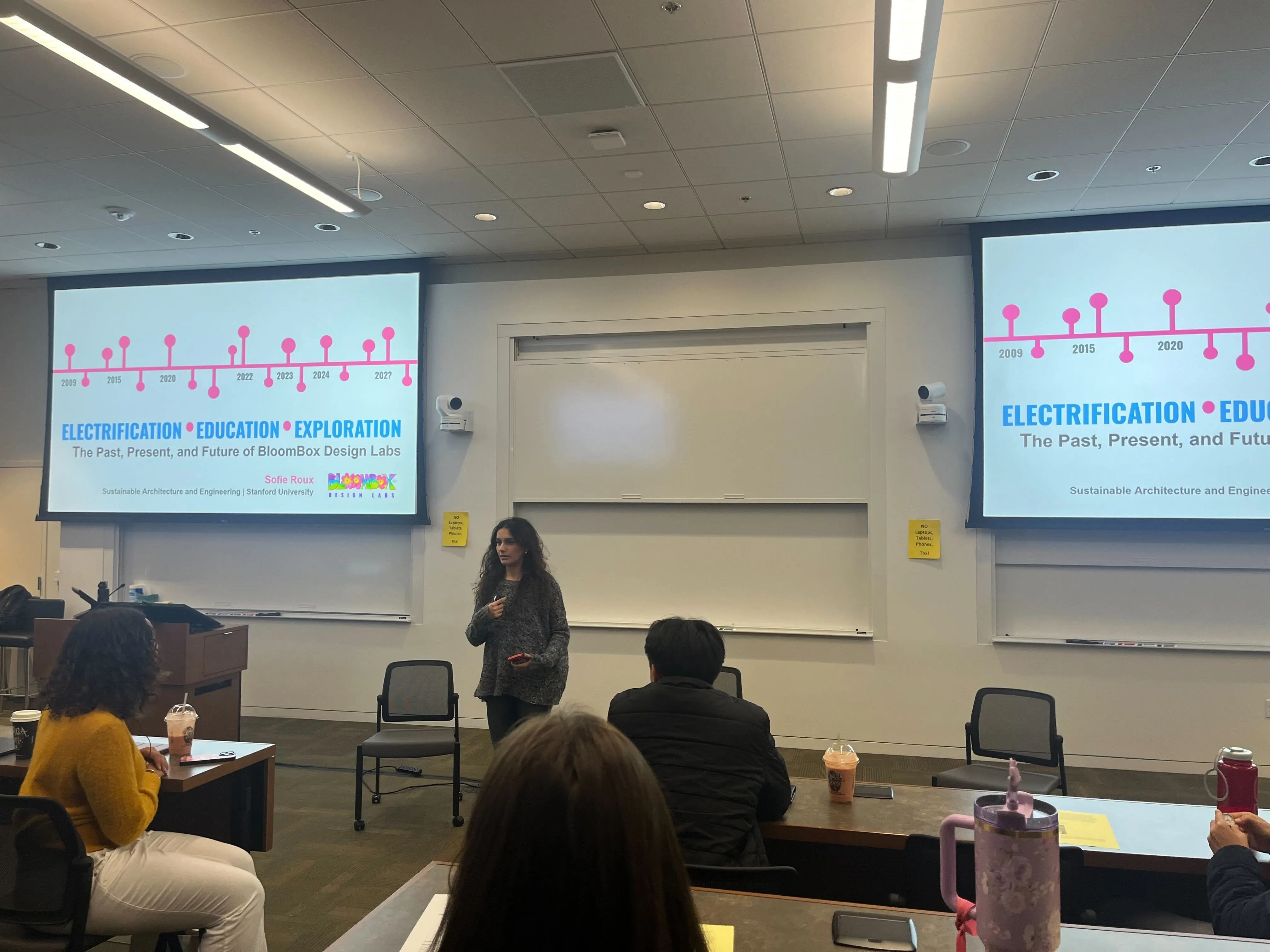Sofie Roux ’26, the founder of BloomBox Design Labs, called for innovative solutions that use everyday objects to tackle global challenges during Monday’s class for the Very Impactful People (V.I.P.) course, URBANST 131.
Roux spoke about the creation of the BloomBox — a transportable, sustainable education hub to provide girls access to Science, Technology, Engineering, Arts and Mathematics (STEAM) education around the world.
The BloomBox is an upcycled metal shipping container with a patented retractable solar roof system that provides students in even the most remote areas of the world with opportunities for learning. Roux, an architecture and material science major at Stanford, was first inspired to create the BloomBox to help her friend Faith Galero achieve her goals of becoming a digital animator.
At the time, Galero lived in Malawi, studying in classrooms that lacked electricity and running water. Roux wanted to build a solution that would give Galero access to the resources needed to achieve her educational goals. Roux first worked with teachers and carpenters to successfully design and build the first BloomBox in her hometown of Vancouver, Canada. After that, Roux and her team transported and set up the BloomBox in Malawi.
Beyond providing a classroom, BloomBox gives those facing systemic barriers a path to a better life. In Malawi, girls often face many barriers to accessing education. BloomBox provides an on-site, off-grid educational center that is mobile, sustainable and adaptable to a community’s needs.
The first BloomBox received attention from the governor of Malawi, who asked Roux and her team to scale the BloomBoxes to 70 schools across the country to support the education of 200,000 students. Roux and her team pitched BloomBox at a Stanford startup challenge and were able to install additional BloomBoxes. Roux also created an app called SuperBloom to provide educational content that is now connected to all of the BloomBoxes through satellite internet.
“If every girl in the world finished 12 years of quality education, lifetime earnings for women will increase by $15 to $30 trillion dollars,” Roux said during her talk. “If we can make high-quality education in STEAM fields universally accessible, the opportunities are limitless, and the whole world benefits.”
When asked about measuring BloomBox’s impact, Roux responded that the “main metric” is university entrance exam pass rates. Currently, she said, “Malawi has university entrance exams that have a 1% pass rate, which is crazy.”
However, at schools with BloomBoxes, college acceptance rates have tripled, she said.
“That’s a really big deal. And I think that it’s because students have the ability to go deep into what they’re learning,” Roux said.
The Stanford Social Entrepreneurial Students’ Association organizes the “V.I.P.” lecture and discussion series that featured Roux’s talk, and the Urban Studies Program sponsors the course.
Each week’s speaker gives a presentation on their pioneering ideas and practices for addressing important social and environmental needs in the United States and abroad, followed by a Q&A session. The topics examined in this quarter’s series focus on the creation of social and environmental organizations that address climate, education, health, foster youth, homelessness and racial inequities. This quarter’s speakers include John Roussel of Colorwave, Anshu Gupta of Goonj, Elizabeth Klodas of Step One Foods and Serita Cox of iFoster.
Professor Melanie Edwards, who teaches the course, remarked on the impact of Roux’s work.
“Roux exemplifies falling in love with a problem and channeling that passion to build a company to solve that problem,” Edwards said. “BloomBox offers the future today for young girls in remote Malawi. It’s preparing them, their families, communities and nation for a better life.”
Alex Liu ’26, a student in the “V.I.P” class who also attended the talk, expressed his admiration for Roux’s work.
“It’s really inspiring that people actually go outside of the country, go outside of their comfort zone to see how the other half lives, and how they then commit their lives to solving problems for them,” Liu said.
Nicholas Neoman ’26, another attendee, said, “Sofie is changing the world, and I can’t wait to watch her ingenious vision come to fruition.”
